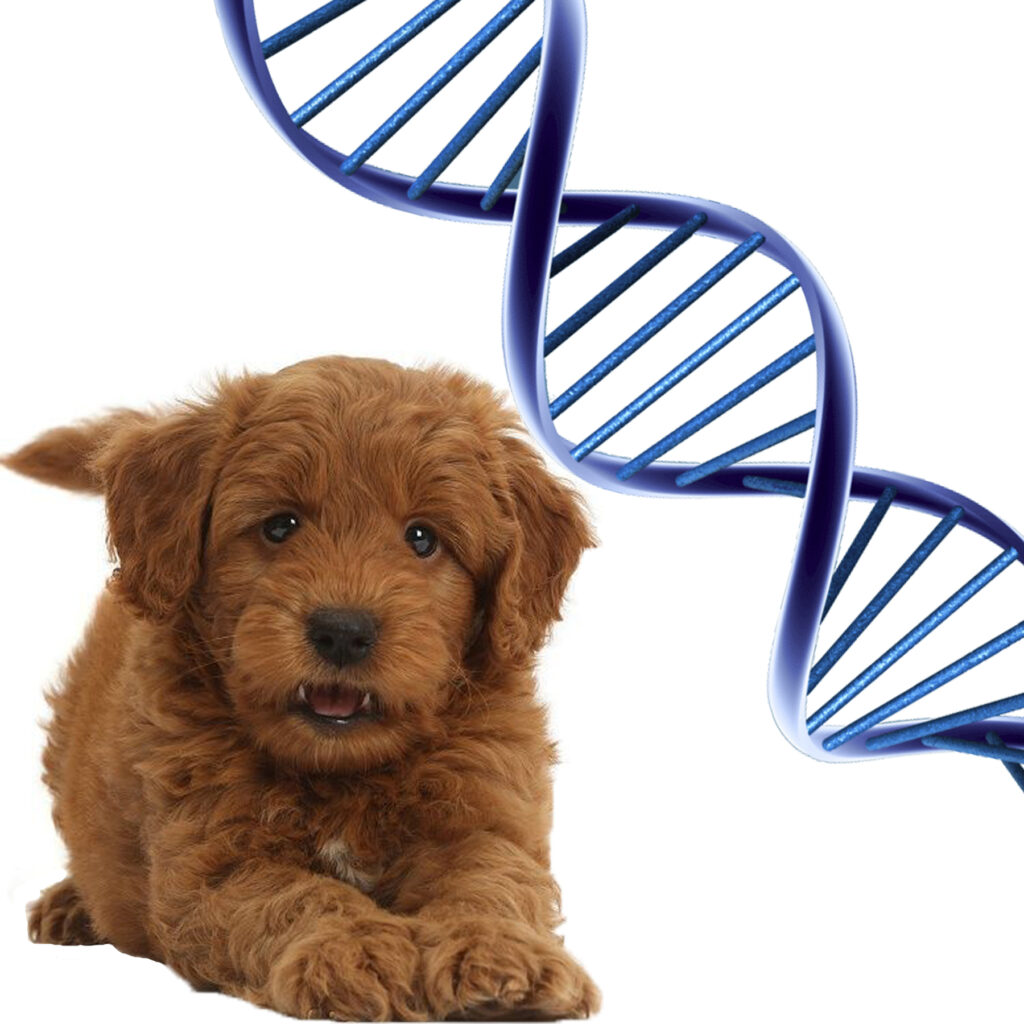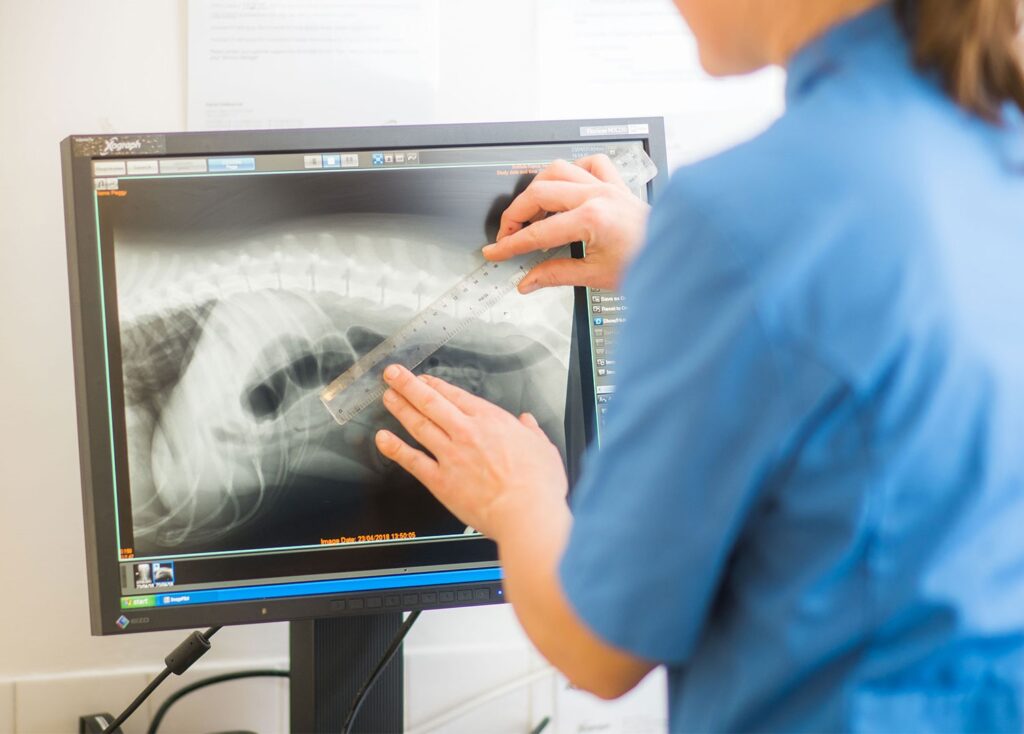At GoldenFido, we focus on the long-term health and of all of the goldendoodles we produce. When we work with our dogs to bring a new litter of life into this world, we want to make sure that the puppies as well as the mother are able to be as healthy as possible. Not only are strict rules and guidelines in place when it comes to how we breed our goldendoodle puppies, but we also obtain a variety orthopedic and genetic clearances for all of our parent dogs so that no hereditary diseases are passed on to our puppies.

We test for all genetic diseases commonly found in both golden retrievers and poodles. In addition we are in compliance with health guidelines set by both, the OFA (Orthopedic Foundation of Animals) and GANA (Goldendoodle Association of North America).
OFA has established control programs that lower the incidence of inherited diseases and GANA is the first and only breed club that is established for the goldendoodle. GANA is a registry database who’s membership is limited only to breeders who are able to provide proof of health clearances that have been achieved on all of their breeding dogs. Additionally, GANA membership requires adhering to a code of ethics when it comes to breeding practices and the care of goldendoodles. Even if you don’t choose to us for your next goldendoodle, by working with a GANA Blue Ribbon breeder you can ensure you’re getting a puppy that was bred to high health standards.
Heart has been examined by a veterinary cardiologist and is free of congential cardiac disease and adult-onset cardiac disease
Eyes have been examined by a board certified Veterinary Ophthalmologist and cleared of all genetic diseases outlined in OFA's Companion Animal Eye Registry
Radiographic screenings for hip and elbow dysplasia have been completed and and given a classification of "good" or better by the Orthopedic Foundation for Animals.
DNA is clear of genetic markers for von WIllebrande Disease, GR-Pra1, Prcd-Pra along with 210+ genetic health risks.
We take pride in the health of our Goldendoodles, ensuring the highest standards through comprehensive genetic testing and exams. This allows us to confidently offer a three-year health guarantee for our puppies. To learn more please click below.
While many breeders rely solely on DNA genetic tests such as Wisdom or Embark. At Goldenfido Goldendoodles use both DNA testing and Radiographic imaging reviewed by the Orthopedic Foundation for Animals, plus numerous examinations by veterinary specialists.
While DNA testing can rule out some diseases due to the presence or lack of a particular gene it cannot rule out all musculoskeletal, eye, or cardiac (heart) issues. That is why our dogs (or their radiographs) are examined by a board certified veterinary ophthalmologist, a cardiologist, and a team of radiologists at OFA to ensure the health and welfare of your new goldendoodle.


All of our parent dogs have the following are certifications and clearances from the Orthopedic Foundation for Animals. These clearances require our dogs to meet with several specialists, including a veterinary Ophthalmologist, Cardiologist, and Radiographers:
Canine Hip Dysplasia– typically develops because of an abnormally developed hip joint but can also be caused by cartilage damage from a traumatic fracture. With cartilage damage or a hip joint that isn’t formed properly, over time the existing cartilage will lose its thickness and elasticity. This breakdown of the cartilage will eventually result in pain with any joint movement.
• Elbow Dysplasia– Elbow dysplasia is a general term used to identify an inherited polygenic disease in the elbow.
• CAER- (Eye)– Genetic diseases are those that are passed on from parent to offspring through genes that carry the codes for each specific trait.
• Cardiac (Heart)– congenital heart disease in dogs is a malformation of the heart or great vessels. The lesions characterizing congenital heart defects are present at birth and may develop more fully during perinatal and growth periods. Many congenital heart defects are thought to be genetically transmitted from parents to offspring; however, the exact modes of inheritance have not been precisely determined for all cardiovascular malformations.

• Neonatal Encephalopathy with Seizures (NEWS) – NEWs is a developmental brain disease. Symptoms are extreme weakness, often accompanied by severe seizures. Symptoms get progressively worse until the puppy dies. Most puppies do not survive the first week, and all usually die before seven weeks of age. Inheritance: Autosomal Recessive. Result types: clear, affected, carrier. Severity: 5, most extreme as it is a fatal disease that may also cause a significant decrease in the quality of life.
• Degenerative Myelopathy (DM) – DM is an adult-onset neurologic condition with progressive limb weakness and muscle loss, usually seen to occur around middle age. There are thought to be other factors that play into the exhibition of this disease. Dogs that carry two genes for DM (affected) are at risk but may not be affected. Mode of Inheritance: Autosomal Recessive with Incomplete Penetrance. Severity: 4, a high degree of severity when the disease manifests as it generally causes a decreased quality of life and may also decrease the life expectancy.
• Golden Retriever Progressive Retinal Atrophy (GR-PRA1) – Affected dogs typically develop symptoms of night blindness or loss of peripheral vision at approximately 6-7 years of age. Result types: clear, affected, carrier.
• Ichthyosis A (ICH) – ICH is a skin condition where the skin becomes thickened and scaly. Because this condition allows the skin’s integrity to be impaired, secondary infections or irritations may occur. The biggest impact is the appearance of the dog and the irritation it causes, although the disease itself is not life-threatening. ICH can manifest in different degrees from mild to severe. Mode of Inheritance: Autosomal Recessive. Severity: 3, moderate degree of severity, as it is not a fatal disease, though it can decrease the quality of life.
• Chondrodysplasia & Chondrodystrophy (CDPA/CDDY) – Chondrodystrophy in dogs is defined by dysplastic, shortened long bones and premature degeneration and calcification of intervertebral discs.